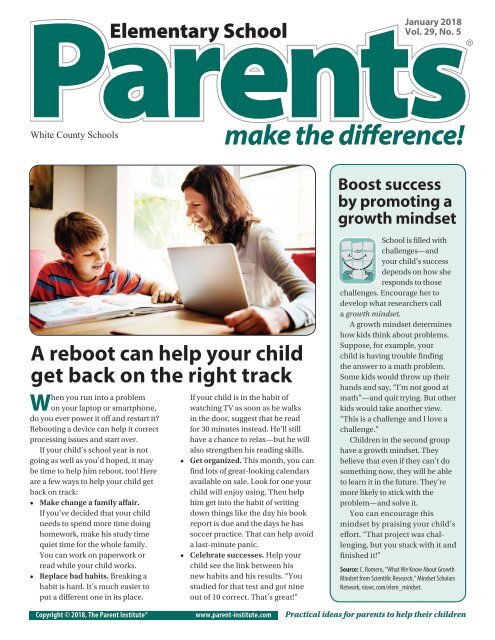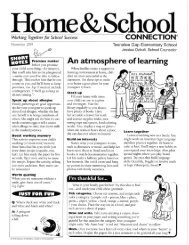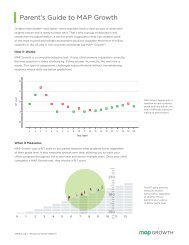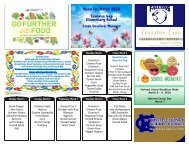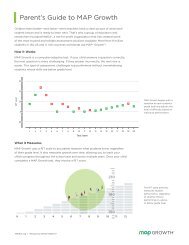Elementary School Parents Magazine
Create successful ePaper yourself
Turn your PDF publications into a flip-book with our unique Google optimized e-Paper software.
January 2018<br />
Vol. 29, No. 5<br />
®<br />
White County <strong>School</strong>s<br />
Boost success<br />
by promoting a<br />
growth mindset<br />
A reboot can help your child<br />
get back on the right track<br />
When you run into a problem<br />
on your laptop or smartphone,<br />
do you ever power it off and restart it?<br />
Rebooting a device can help it correct<br />
processing issues and start over.<br />
If your child’s school year is not<br />
going as well as you’d hoped, it may<br />
be time to help him reboot, too! Here<br />
are a few ways to help your child get<br />
back on track:<br />
• Make change a family affair.<br />
If you’ve decided that your child<br />
needs to spend more time doing<br />
homework, make his study time<br />
quiet time for the whole family.<br />
You can work on paperwork or<br />
read while your child works.<br />
• Replace bad habits. Breaking a<br />
habit is hard. It’s much easier to<br />
put a different one in its place.<br />
If your child is in the habit of<br />
watching TV as soon as he walks<br />
in the door, suggest that he read<br />
for 30 minutes instead. He’ll still<br />
have a chance to relax—but he will<br />
also strengthen his reading skills.<br />
• Get organized. This month, you can<br />
find lots of great-looking calendars<br />
available on sale. Look for one your<br />
child will enjoy using. Then help<br />
him get into the habit of writing<br />
down things like the day his book<br />
report is due and the days he has<br />
soccer practice. That can help avoid<br />
a last-minute panic.<br />
• Celebrate successes. Help your<br />
child see the link between his<br />
new habits and his results. “You<br />
studied for that test and got nine<br />
out of 10 correct. That’s great!”<br />
<strong>School</strong> is filled with<br />
challenges—and<br />
your child’s success<br />
depends on how she<br />
responds to those<br />
challenges. Encourage her to<br />
develop what researchers call<br />
a growth mindset.<br />
A growth mindset determines<br />
how kids think about problems.<br />
Suppose, for example, your<br />
child is having trouble finding<br />
the answer to a math problem.<br />
Some kids would throw up their<br />
hands and say, “I’m not good at<br />
math”—and quit trying. But other<br />
kids would take another view.<br />
“This is a challenge and I love a<br />
challenge.”<br />
Children in the second group<br />
have a growth mindset. They<br />
believe that even if they can’t do<br />
something now, they will be able<br />
to learn it in the future. They’re<br />
more likely to stick with the<br />
problem—and solve it.<br />
You can encourage this<br />
mindset by praising your child’s<br />
effort. “That project was challenging,<br />
but you stuck with it and<br />
finished it!”<br />
Source: C. Romero, “What We Know About Growth<br />
Mindset from Scientific Research,” Mindset Scholars<br />
Network, niswc.com/elem_mindset.<br />
Copyright © 2018, The Parent Institute® www.parent-institute.com Practical ideas for parents to help their children
Copyright © 2018, The Parent Institute®<br />
Share test-taking tips to boost<br />
your child’s performance<br />
Regardless of how<br />
well your child knows<br />
the material before a<br />
test, he will benefit from<br />
knowing some basic<br />
test-taking strategies. Encourage<br />
your child to:<br />
• Read carefully. This applies to<br />
directions, questions and answers.<br />
• Ask questions. If your child doesn’t<br />
understand the directions or a question,<br />
he should ask the teacher for<br />
clarification before he starts.<br />
• Manage his time. Tell him to look<br />
over the questions and answer the<br />
easy ones first. If he gets stuck on<br />
an especially hard question, he<br />
should move on and come back to<br />
that question when he’s finished<br />
everything else.<br />
You’re proud of your<br />
child for learning to read.<br />
But remember that reading<br />
skills must be developed<br />
and maintained. The older<br />
your child gets, the more she’ll depend<br />
on them for learning.<br />
To support your child’s education<br />
and foster her reading progress:<br />
1. Go beyond books. Let her select<br />
reading materials she likes. She<br />
doesn’t have to limit herself to<br />
books. Encourage her to read comics,<br />
magazines, age-appropriate<br />
news articles, video game instructions<br />
and recipes.<br />
2. Make connections. When you<br />
plan a trip, find books related<br />
to the location. Or, have your<br />
child read about historical events<br />
that happened near your home.<br />
• Use the process of elimination<br />
when answering multiple choice<br />
questions. He should cross off<br />
answers he knows can’t be right.<br />
Then he can focus on choosing<br />
between the answers that are left.<br />
• Be neat. His handwriting should<br />
be clear and his mistakes should<br />
be erased completely.<br />
• Use extra time to review his answers<br />
and check for careless mistakes.<br />
“There are no secrets to<br />
success. It is the result of<br />
preparation, hard work,<br />
and learning from failure.”<br />
—Colin Powell<br />
Support your child’s reading<br />
progress with seven strategies<br />
3. Build excitement. Make reading<br />
irresistible. Let your child stay up<br />
15 minutes later to read in bed.<br />
Or, let her build a fort in her room<br />
and read by flashlight.<br />
4. Role-play. Turn favorite books into<br />
family plays or movies. Add props<br />
and costumes.<br />
5. Suggest she join (or start) a book<br />
club. Get friends together for bookrelated<br />
discussions, activities and<br />
snacks.<br />
6. Set a timer. If your child resists<br />
reading, a timer might help. Say,<br />
“Read to me for three minutes.<br />
When the timer beeps, you can<br />
stop.” Add a minute every few days.<br />
7. Read aloud. Try reading more<br />
advanced books. When parents<br />
read to them, kids enjoy more<br />
challenging words and stories.<br />
www.parent-institute.com<br />
Are you teaching<br />
your child to use<br />
time wisely?<br />
Time management is an<br />
important skill for school<br />
success. The school year is<br />
half over, so now is a good<br />
time to take a few minutes<br />
to think about whether you’re helping<br />
your child use her time wisely.<br />
Answer yes or no to each of the<br />
questions below:<br />
___1. Have you reviewed your child’s<br />
homework and study schedule and<br />
made adjustments as necessary?<br />
___2. Do you use your family calendar<br />
to record dates for tests, projects and<br />
extracurricular activities?<br />
___3. Do you try to keep a balance<br />
between your child’s activities and<br />
the rest of your lives? If your child is up<br />
past his bedtime every night finishing<br />
homework, it’s time to cut back.<br />
___4. Do you help your child break<br />
down big assignments into smaller<br />
chunks?<br />
___5. Do you make sure that your<br />
child has some time each day for fun<br />
or relaxation?<br />
How well are you doing?<br />
Each yes means you are helping your<br />
child learn to use time wisely. For no<br />
answers, try those ideas in the quiz.<br />
Practical Ideas for <strong>Parents</strong> to Help<br />
Their Children. ISSN: 1523-1275<br />
1046-0446<br />
For subscription information call or write:<br />
The Parent Institute ® , 1-800-756-5525,<br />
P.O. Box 7474, Fairfax Station, VA 22039-7474.<br />
Fax: 1-800-216-3667.<br />
Or visit: www.parent-institute.com.<br />
Published monthly September through May.<br />
Copyright © 2018, The Parent Institute,<br />
a division of PaperClip Media, Inc., an<br />
independent, private agency. Equal<br />
opportunity employer.<br />
Publisher: L. Andrew McLaughlin.<br />
Publisher Emeritus: John H. Wherry, Ed.D.<br />
Editor: Rebecca Hasty Miyares.<br />
®<br />
2 • <strong>Elementary</strong> • <strong>Parents</strong> make the difference! • January 2018<br />
X02337958
www.parent-institute.com<br />
Research disproves these five<br />
common myths about learning<br />
Research shows that while<br />
people often believe they<br />
understand what “effective<br />
learning” looks like, they’re<br />
frequently mistaken.<br />
Here are five common myths about<br />
learning, along with the reseach-based<br />
facts:<br />
• Myth #1: Everyone has a specific<br />
learning style. Fact: Kids learn in all<br />
kinds of ways. In one situation, they<br />
may do better hearing new material.<br />
But in another? Seeing examples<br />
could be key.<br />
• Myth #2: You’re either born smart or<br />
you’re not. Fact: Children’s IQs and<br />
abilities can increase over time—<br />
especially when they’re given access<br />
to books and learning opportunities.<br />
• Myth #3: Long study sessions are the<br />
best way to prepare for a quiz or test.<br />
Keep your discipline technique<br />
simple to reduce frustration<br />
There’s no way around<br />
it: Your child is going<br />
to misbehave at some<br />
point—and it’s going to<br />
be frustrating! You can’t<br />
change that, but you can control your<br />
expectations and responses. That’s why<br />
the American Academy of Pediatrics<br />
offers parents this advice:<br />
• Be realistic about your child’s<br />
abilities. If you demand too<br />
much from her, you’ll both be<br />
disappointed. Make a few simple<br />
rules your child can understand.<br />
Match them to her age and level of<br />
maturity. Then expect a reasonable<br />
amount of cooperation.<br />
• Mean what you say. Think carefully<br />
before you state a rule, a promise<br />
or consequence. Is it fair? Will you<br />
Fact: Kids retain facts much better<br />
if the information is spread out over<br />
time. Studying a little each day is<br />
much more effective than trying to<br />
digest everything in one sitting.<br />
• Myth #4: Reading material over and<br />
over is the best way to learn it. Fact:<br />
It’s more effective for students to<br />
restate key ideas in their own words.<br />
• Myth #5: Right-brained students<br />
learn differently than left-brained<br />
ones. Fact: There’s no evidence<br />
that being left-brained (favoring<br />
logic and math) or right-brained<br />
(favoring art and emotions) has an<br />
impact on learning. Actually, there’s<br />
no proof that one side of the brain<br />
even dominates at all.<br />
Source: A. Kamenetz, “You Probably Believe Some<br />
Learning Myths: Take Our Quiz To Find Out,” NPR, niswc.<br />
com/elem_myths.<br />
really follow through? Once you’ve<br />
made a good decision, stick to it!<br />
Kids make better choices when they<br />
can count on what parents say.<br />
• Consider your child’s feelings.<br />
Kids appreciate parents’ understanding.<br />
It helps them behave.<br />
Say, “I know you’re disappointed<br />
that you can’t have a sleepover.<br />
Maybe another night.”<br />
• Be forgiving. No child—or parent—<br />
is perfect. If you do something you<br />
regret, such as yell at your child,<br />
discuss it when you’re calm.<br />
Apologize and say what you’ll do<br />
differently next time. Then keep<br />
your word! Teach your child that<br />
everyone can learn from mistakes.<br />
Source: “Disciplining Your Child,” American Academy<br />
of Pediatrics, niswc.com/elem_healthydiscipline.<br />
Copyright © 2018, The Parent Institute®<br />
Q: Lately, my child has been<br />
telling me he hates school. He<br />
doesn’t say it every day, but he<br />
has said it more than once. I’m<br />
not sure how to respond—he has<br />
to go to school, after all. How can<br />
I get to the root of the problem<br />
so I can help?<br />
Questions & Answers<br />
A: Not all children who say they<br />
hate school actually hate it.<br />
Sometimes, they’re just looking for<br />
attention—or for a chance to put off<br />
doing homework.<br />
However, if your son has said<br />
he hates school more than once,<br />
there could be something going on.<br />
Here’s what to do:<br />
1. Talk to your son. Wait for a time<br />
when he’s relatively calm and<br />
when you have time to talk.<br />
Then ask him to tell you how<br />
he’s feeling and why. “You’ve said<br />
you hate school a couple times.<br />
What’s making you feel this way?”<br />
2. Identify the problem. Listen<br />
closely to what your child says.<br />
Is he struggling in a class? Are<br />
students mean to him on the<br />
bus? Is he feeling overwhelmed<br />
because he’s participating in<br />
too many activities?<br />
3. Help your child find solutions.<br />
For example, if he’s struggling in<br />
a class, encourage him to spend<br />
more time on the subject and<br />
make sure he is turning in his<br />
homework.<br />
4. Be positive. Help your child<br />
see that nearly every situation<br />
has positives and negatives. By<br />
focusing on the positive, he can<br />
change his entire outlook.<br />
5. Talk to your child’s teacher.<br />
Let her know how your child is<br />
feeling and ask for her support.<br />
When parents and teachers work<br />
together, students are more likely<br />
to succeed!<br />
January 2018 • <strong>Elementary</strong> • <strong>Parents</strong> make the difference! • 3
Copyright © 2018, The Parent Institute®<br />
Help your child<br />
make learning<br />
resolutions<br />
The start of a new year<br />
is a traditional time for<br />
making resolutions.<br />
Why not help your child<br />
make some learning<br />
resolutions to help her finish the<br />
school year strong?<br />
Here’s how:<br />
1. Start a conversation. Tell your<br />
child something you’ve resolved<br />
to change. “This year, I’m going to<br />
get more exercise and cut back on<br />
watching TV.” It’ll show her that a<br />
resolution is really just a promise<br />
you make to yourself.<br />
2. Get her thinking. Are there<br />
things she’s struggled with in<br />
class? Nudge her toward making<br />
improvements. “You’ve had<br />
trouble getting your homework<br />
done on time. What could you<br />
do to fix that?” Creating a study<br />
routine, starting projects earlier,<br />
or organizing her school supplies<br />
are three examples of things she<br />
could resolve to do.<br />
3. Define the goal. Resolutions can<br />
be vague. She can make hers<br />
concrete by turning it into a<br />
specific goal. Use her “creating<br />
a study routine” resolution and<br />
make it real. “I resolve to spend<br />
at least 15 minutes studying every<br />
day.” When a goal is measurable,<br />
it is easier to achieve.<br />
4. Be supportive. Resolutions have<br />
a way of fading away. So support<br />
your child if she starts to slip. “I<br />
know it’s hard to stick to a study<br />
routine, but you can do it!” Remind<br />
her that falling short once in a<br />
while doesn’t mean she can’t get<br />
back on track.<br />
It Matters: Motivation<br />
child’s experiences at school<br />
A affect her attitude about learning,<br />
and so do her experiences at home.<br />
To build your child’s enthusiasm for<br />
education:<br />
• Be a role model. If you have a<br />
positive attitude about school,<br />
your child is more likely to feel<br />
the same way. In addition to<br />
saying good things about school,<br />
attend school meetings, parentteacher<br />
conferences and other<br />
school events. Supervise your<br />
child’s homework time and show<br />
interest in her school day.<br />
• Compliment success. When<br />
your child works hard, be sure<br />
to speak up! This helps her make<br />
a connection between effort and<br />
taking pride in her success.<br />
There are just some<br />
things that money can’t<br />
buy—including smarts,<br />
motivation and school<br />
success. Here’s why<br />
experts discourage using money<br />
as a reward for good grades:<br />
• It places the emphasis on the<br />
wrong thing. If you promise your<br />
child money for a good grade, he’ll<br />
be working for the money rather<br />
than working to learn. He may find<br />
that he wants the money so badly<br />
that he’s willing to cheat to get it.<br />
• It doesn’t help your child learn<br />
the satisfaction of doing a job well.<br />
Children need to learn the joy that<br />
comes from just doing something<br />
www.parent-institute.com<br />
Build your child’s enthusiasm<br />
about school and learning<br />
• Link lessons to real life. Show<br />
your child how what she learns<br />
at school can help her in real life.<br />
Math skills may help her spend<br />
money wisely. A vocabulary word<br />
may show up in a favorite book.<br />
Paying your child for grades<br />
is not an effective motivator<br />
to the best of their ability. Great<br />
pride comes with handing in one’s<br />
best work. That is the reward your<br />
child ought to be striving for.<br />
• It focuses on the outcome rather<br />
than the effort. Children need<br />
to learn the importance of trying<br />
their best and sticking with<br />
challenging subjects. Putting<br />
all his attention on a reward at<br />
the end of the process will make it<br />
harder for your child to learn that<br />
lesson.<br />
So what should you do? Let your<br />
child know that school is important.<br />
Celebrate his successes with time<br />
spent together. And keep your money<br />
in your pocket!<br />
4 • <strong>Elementary</strong> • <strong>Parents</strong> make the difference! • January 2018


